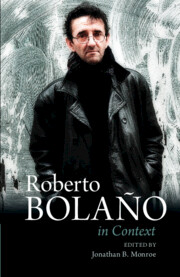Book contents
- Roberto Bolaño in Context
- Roberto Bolaño in Context
- Copyright page
- Contents
- Contributors
- Chronology
- Part I Geographical, Social, and Historical Contexts
- Part II Shaping Events and Literary History
- Part III Genres, Discourses, Media
- Chapter 16 Essays and Short Stories
- Chapter 17 Poetry I: The Ghost That Runs through the Writing
- Chapter 18 Poetry II: Parody and the Question of History
- Chapter 19 The Novel and the Canon
- Chapter 20 Detective Fiction
- Chapter 21 Journalism, Media, Mass Culture
- Chapter 22 Literary Criticism and Literary History
- Part IV Aesthetics, Culture, and Politics
- Further Reading
- Index
Chapter 21 - Journalism, Media, Mass Culture
from Part III - Genres, Discourses, Media
Published online by Cambridge University Press: 15 December 2022
- Roberto Bolaño in Context
- Roberto Bolaño in Context
- Copyright page
- Contents
- Contributors
- Chronology
- Part I Geographical, Social, and Historical Contexts
- Part II Shaping Events and Literary History
- Part III Genres, Discourses, Media
- Chapter 16 Essays and Short Stories
- Chapter 17 Poetry I: The Ghost That Runs through the Writing
- Chapter 18 Poetry II: Parody and the Question of History
- Chapter 19 The Novel and the Canon
- Chapter 20 Detective Fiction
- Chapter 21 Journalism, Media, Mass Culture
- Chapter 22 Literary Criticism and Literary History
- Part IV Aesthetics, Culture, and Politics
- Further Reading
- Index
Summary
This chapter argues that thinking about Roberto Bolaño in the context of journalism and mass culture means recognizing how mainstays of globalized twentieth-century journalistic communication – photographic realism, reportage with a pretension of objectivity, investigative journalism – as well as discourses about literature, have circulated differently in Latin America, Europe, and the United States. Explores in particular the convergences and divergences between Latin American and Spanish crónicas and North American New Journalism in Bolaño’s fiction and in his own newspaper writing, the essay argues that Bolaño’s portrayal of the daily cultural and political contexts one confronts in the newspaper reflects his suggestion that readers are always exiles, and that they produce a commentary on seeing as both a journalistic practice and a metaphor for social understanding. Bolaño draws on, but also rewrites, the history of literary journalism in a wider Atlantic world, even as he comments on the superficiality of mass media and culture. Discussing Bolaño’s engagement with cronistas such as Rubén Darío, Enrique Gómez Carrillo, Carlos Monsiváis, and Pedro Lemebel, the chapter includes discussions of 2666, Los detectives salvajes, Bolaño’s short stories, and articles he wrote for newspapers and magazines in Spain and Chile.
- Type
- Chapter
- Information
- Roberto Bolaño In Context , pp. 237 - 249Publisher: Cambridge University PressPrint publication year: 2023



